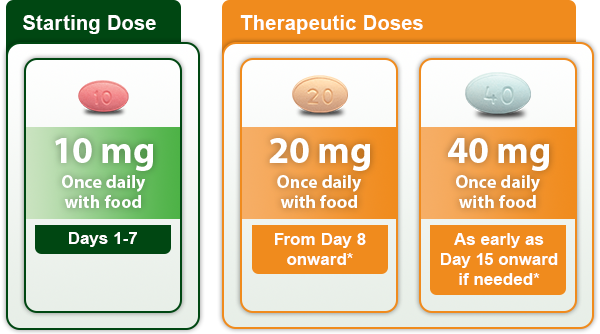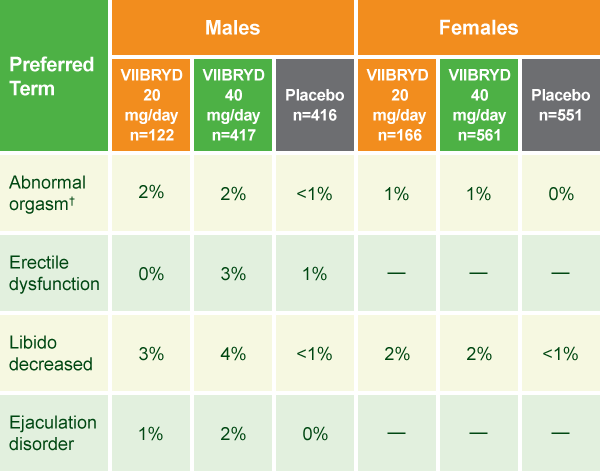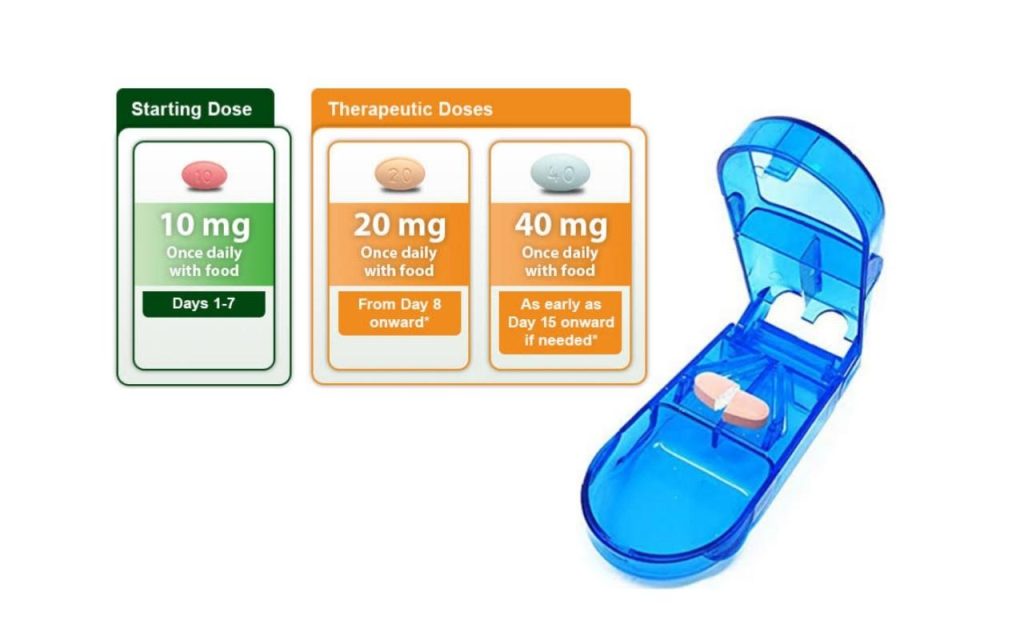Viibryd is a drug prescribed to help treat depression. It belongs to a class of drugs called selective serotonin reuptake inhibitors, or SSRIs. As with all medications, it is important to understand how viibryd works, what possible side effects there may be, and other important information before taking this medication. In this article, we will discuss the basics of viibryd: what it is, how it works, and some things you should know before taking it.
Contents
Understanding Vilazodone (Viibryd)

Viibryd is a drug that belongs to a class of antidepressants called selective serotonin reuptake inhibitors, or SSRIs. This type of antidepressant works by blocking the action of the brain chemical serotonin to treat depression. It is used for people who have a major depressive disorder, and other mood disorders such as anxiety disorder (GAD) or obsessive-compulsive disorder (OCD).
Action Mechanism

The way viibryd works is by blocking the action of serotonin in the brain. Serotonin is a neurotransmitter, which is a chemical that helps to relay messages between nerve cells. When there is not enough serotonin, it can lead to depression and other mood disorders. By blocking the action of serotonin, viibryd can help to relieve symptoms of depression.
SSRIs
Drugs that block the action of serotonin in the brain are called selective serotonin reuptake inhibitors (SSRIs). These drugs work by blocking an enzyme that breaks down serotonin, leading to increased levels of this chemical in the brain. This increase in serotonin has been shown to improve mood in people with depression.
Important Information I Should Know About Vilazodone
There are some important things to know before taking viibryd, including the following:
- Viibryd should not be taken by people who are allergic to vilazodone or any of the ingredients in the medication.
- Viibryd should not be taken by people who have narrow-angle glaucoma or are taking a monoamine oxidase inhibitor (MAOI).
- It is important to tell your doctor if you are planning on having any surgeries, including dental procedures.
Specific Concerns About Vilazodone And Pregnancy
There are some specific concerns to keep in mind when it comes to pregnancy while taking viibryd.
- First, it is important to know that viibryd should not be taken by pregnant women, there have been few reports of viibryd causing birth defects in humans.
- Furthermore, it can pass through breast milk and harm a nursing baby. As a result, women who are breastfeeding should not take viibryd.
If you are pregnant or plan on becoming pregnant while taking this drug, talk to your doctor about the risks and benefits of doing so. They can help you decide whether or not to take viibryd while pregnant.
Things To Discuss With My Doctor Before Taking Vilazodone
Before starting viibryd, be sure to talk with your doctor about all of the potential risks and benefits associated with this medication. You should also tell your doctor if you have or had:
- Liver problems
- Kidney problems
- A bleeding disorder such as hemophilia A, B, and C
- Von Willebrand disease (VWD)
- Factor V Leiden defect
- Factor XII deficiency (hemophilia type II)
- Any other medical conditions
NOTE: If you have any questions about viibryd, talk with your doctor. They can answer all of your questions and help you make an informed decision about taking this medication.
Administering Vilazodone (Viibryd)

Viibryd is available in two strengths: 20mg and 40mg. It comes in both a tablet form and a capsule form.
How Should I Take Vilazodone?
It is important to take vilazodone exactly as prescribed by your doctor. Do not take more or less than what they tell you to take. Viibryd should be taken orally, with water, and can be taken either with or without food.
The recommended dosage for viibryd is 20mg once a day. If you are starting viibryd for the first time, your doctor may start you at a lower dosage and then increase it to 20mg once a day after one week.
How Long Does It Take For Vilazodone To Work?
It can take up to four weeks for vilazodone to start working. If you do not notice any improvement in your symptoms after taking viibryd for four weeks, talk to your doctor. They may need to adjust your dosage or try a different medication. However, it is important to continue taking viibryd even if you do not notice any changes right away. If you stop taking the medication suddenly, your symptoms can return and this can lead to serious complications.
What Happens If I Miss A Dose or Overdose With Vilazodone?
If you miss a dose of vilazodone, take it as soon as possible. However, if it is almost time for your next dose, skip the missed dose and continue with your regular schedule. Do not take two doses at once.
If you overdose on vilazodone, call 911 or go to the nearest emergency room for treatment right away. Overdosing on viibryd can be a serious and life-threatening event. Symptoms of an overdose may include:
- Heart problems, such as a rapid or irregular heartbeat
- Seizures
- Coma
What Should I Avoid While Taking Vilazodone?
There are some things you should avoid while taking vilazodone, including the following:
- Alcohol – Drinking alcohol with vilazodone can increase your chances of having serious side effects.
- Viibryd and Grapefruit Juice – Drinking grapefruit juice while taking viibryd can increase the amount of the medication in your bloodstream, which may cause an overdose.
- Drugs That May Interact With Vilazodone – Some drugs may interact with vilazodone and increase your risk of side effects. Be sure to tell your doctor about all the medications you are taking, including over-the-counter drugs and supplements.
Evaluating Vilazodone (Viibryd)

Most people who take viibryd do not experience any serious side effects. However, some possible side effects can occur with vilazodone.
Common Side Effects
The most common side effects of viibryd include:
- Nausea and/or vomiting
- Diarrhea or constipation
- Dizziness
- Insomnia (sleeplessness)
- Dry mouth or increased thirst
- Weight gain or weight loss
Rare/serious side effects
Serious side effects that can occur with viibryd are rare but they can be life-threatening. Some of the more serious side effects include:
- Suicidal thoughts or behavior
- Heart problems, such as a rapid or irregular heartbeat
- Seizures
- Coma
NOTE: If you experience any serious side effects while taking vilazodone, call your doctor right away.
Risks For Taking Vilazodone For Long Periods Of Time
There is not much information on the long-term side effects of taking vilazodone. However, some potential risks can occur with other SSRIs and SNRIs. These include:
- Weight gain
- Sexual dysfunction (decreased sex drive or inability to have an orgasm)
- Increased risk of bleeding, especially if you are taking other medications that can increase your risk of bleeding
NOTE: If you have any questions about viibryd, talk with your doctor. They can answer all of your questions and help you make an informed decision about taking this medication.
Medications That May Interact With Vilazodone
Some medications can interact with vilazodone, including the following:
MAOIs (such as selegiline): Taking MAOIs with viibryd can increase your risk of having a serious drug interaction.
Buprenorphine (such as Suboxone): Taking buprenorphine with viibryd can increase your risk of having a serious drug interaction.
Stimulants (such as amphetamine): Taking stimulants with viibryd can increase your risk of having a serious drug interaction.
Herbal supplements (such as St. John’s wort): Herbal supplements can interact with vilazodone and may decrease its effectiveness.
Barbiturates (such as phenobarbital): These medications can increase the amount of vilazodone in your bloodstream, which may lead to an overdose.
Benzodiazepines (such as alprazolam, diazepam, and lorazepam): These medications can decrease the effects of vilazodone and may cause withdrawal symptoms if you stop taking them suddenly.
Over-the-counter cough and cold medicines: Some over-the-counter cough and cold medicines contain dextromethorphan, which can interact with vilazodone.
Drugs to treat HIV/AIDS (such as ritonavir, atazanavir, lopinavir/ritonavir, or indinavir): These medications can increase the amount of vilazodone in your bloodstream, which may lead to an overdose.
NOTE: This is not a complete list of drugs that may interact with vilazodone. Be sure to tell your doctor about all the medications you are taking, including over-the-counter drugs and supplements.
Summary of FDA Black Box Warnings
The Food and Drug Administration (FDA) has issued a black box warning for vilazodone. A black box warning is the most serious type of warning that can be issued for a medication. It means that there is evidence that the drug may cause serious or life-threatening side effects. Some of the risks associated with taking vilazodone include:
- Suicidal thoughts or behavior
- Heart problems, such as a rapid or irregular heartbeat
- Seizures
- Coma
If you experience any of these risks while taking vilazodone, call your doctor right away.
NOTE: The FDA has also issued a black box warning for other SSRIs and SNRIs. These warnings are important to be aware of if you are considering taking vilazodone or any other medication in this class.
DISCLAIMER: This article is for informational purposes only and does not constitute medical advice. The information contained herein is not a substitute for and should never be relied upon for professional medical advice. Always talk to your doctor about the risks and benefits of any treatment.
Experts’ Opinion On Viibryd
So far, vilazodone has not been linked to any serious long-term side effects. However, more research is needed to know for sure. Some experts believe that vilazodone may be a safer option than other SSRIs and SNRIs, but more research is needed to confirm this.
Case Study

A 31-year-old female presented with depression, fatigue, and hopelessness. She was prescribed Viibryd at the start of this case study because she did not want to take an SSRI or SNRI due to their side effect profiles. At the time that she began taking it, she was experiencing a moderate level of depression.
After taking Viibryd for six weeks, the patient’s mood had improved significantly. She no longer felt fatigued or hopeless, and her overall mood was much better. Additionally, her sleep quality had improved and she reported feeling more energetic. However, she did experience a few side effects during this time, including dizziness, dry mouth, and nausea.
Conclusion
Overall, Viibryd is an effective treatment for depression yet more research will establish its safety and efficacy. However, in most cases, it has a good safety profile and can improve mood, energy levels, and sleep quality. While it may cause some side effects, these are generally mild and tolerable. If you are struggling with depression, Viibryd may be a good option for you. Nonetheless, talk to your doctor to see if it is right for you.
A Word From Therapy Mantra
Your mental health — Your psychological, emotional, and social well-being — has an impact on every aspect of your life. Positive mental health essentially allows you to effectively deal with life’s everyday challenges.
At TherapyMantra, we have a team of therapists who provide affordable online therapy to assist you with issues such as depression, anxiety, stress, workplace Issues, addiction, relationship, OCD, LGBTQ, and PTSD. You can book a free therapy or download our free Android or iOS app.


